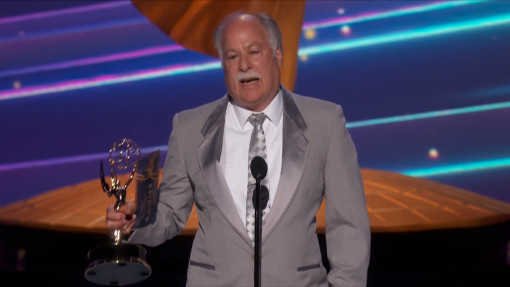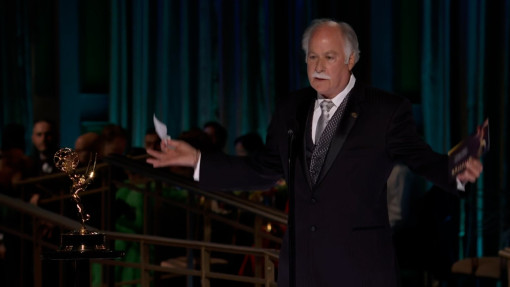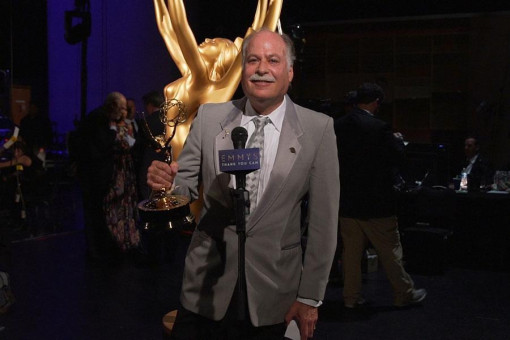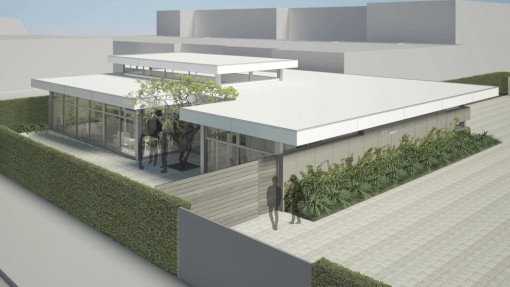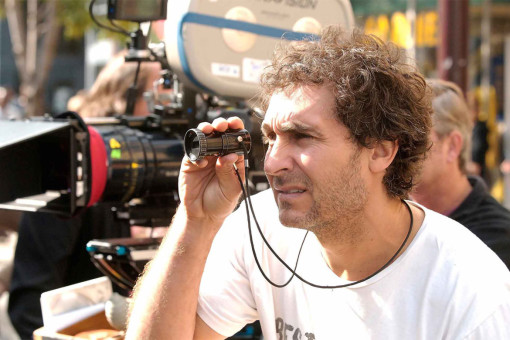After an 11 year hiatus, NBC's Will & Grace has made its triumphant return to network television, welcoming back the core four series stars: Eric McCormack, Debra Messing, Sean Hayes, and Megan Mullally, as well as a multitude of familiar names behind the scenes.
The revival of Will & Grace sees its original writers and many department heads return to once again cast light into a polished NYC apartment and onto beautiful faces skillfully zinging each other with a repartee of a contemporary cadence.
TelevisionAcademy.com had the pleasure of visiting the Will & Grace stage at Universal Studios, Hollywood, to sit down with the show's award winning cinematographer and Television Academy governor Gary Baum, ASC, and talk about his role on the show and what it's like to come back to work on a sitcom that has not seen his light in over a decade.
In my research, I found a lot of information regarding your résumé and accolades, but not a lot about you. So, the question everyone asks upon first meet someone in Los Angeles… where are you from and how did you get your start in film and television?
Well, I grew up in New York and went to school there. When I was in high school, they were shooting The French Connection; the famous car chase scene was right by my station and when I got off the train and saw them shooting, I thought, "This is great. THIS is what I have to do."
Wow! The French Connection. Pretty bold to be a pedestrian on those streets during THAT car chase scene.
Oh, we had a blast! It's one of my favorite films of all time, it's a classic. We were kids, 16 years old, just watching the chase - seeing the guy getting shot on the steps - those were the same steps I used to get to school every day, it was really fun! My buddies and I hung out for two or three days just watching the production and, having always been into photography, I was specifically watching the camera.
And that's when you "knew"?
Yes, that was when I got the bug; I knew exactly what I wanted to do. I moved to Los Angeles in 1976 and somehow got a job at Panavision, working in the electronic department. Then I got a job at MGM as a film loader.
As so many other greats have done, you worked your way up the ladder.
Exactly. I worked my way up from loader, to camera assistant, to camera operator, to director of photography. Matter of fact, I first moved up to DP on Will & Grace. Max (Mutchnick) and David (Kohan), Tim (Kaiser), and my mentor, Tony Askins, ASC, who was the original cinematographer on the show, moved me up when he (Tony) retired, so I became the director of photography on Will & Grace in 2005, after having been its camera operator since the beginning.
It is well known that you and director James Burrows have a long and wonderful history. Tell me a little bit about that working relationship.
Oh yes, I met Jimmy as a camera assistant when we were on Friends and our paths crossed later on when I was operating and he was directing Will & Grace. I've known him for over 20 years and he was instrumental in moving me up on this show.
Jimmy and I have a nice shorthand communication. He's got certain specific visuals he likes and my crew and I know what they are and how to achieve them quickly. It's a great working relationship; there's no one like him.
What's the biggest difference, for you, between Will & Grace "then" and Will & Grace "now"?
Originally, we shot on film so the big difference for me is we're now shooting digital. It's just a different medium. My lighting has changed a little bit because the cameras are much faster. We're shooting at a different ASA rating; we were originally shooting at maybe 400 ASA and now we're shooting at 1200, so it's three times as fast. I'm not using three times less light; I'm just using less intensity.
How does a typical week in the life of making an episode of Will & Grace play out?
So, its' a five day show: we have a table read, then we rehearse and make changes, and then shoot in front of a live audience. We light the room first because we have to start lighting somewhere and don't yet know exactly where the actors are going to be.
Then we watch rehearsal and see where people are moving and where they are not, and we adjust accordingly. It can be tricky because we're working with four cameras so we have to light for all of them and everything has to look similar.
You'll notice there are no lights on the floor because it's a multi-camera show and the cameras are always moving. It's like a ballet. You're basically filming a stage production so I can't have any lights on the floor; everything is hung in the rafters.
And the technology is a lot different now, it's all LED and we can dim remotely, and do things like that.
Does that make your life easier or more difficult?
We can do things more quickly, so in essence it's easier, but it's also more demanding because situational comedies are more demanding then they were 10 or 12 years ago.
How so?
Well, you can't just have four people sitting on a couch and talking, it just doesn't really work anymore. Occasionally it's okay, but all the sitcoms now have different kinds of things they're doing visually, so we go out on location more and we have more swing sets than we used to.
I think shows are written differently now, too; they write more to the audience rather than just writing the dialogue. But this show is special in that vein because the writing is so excellent. So we can have four people in the living room for eight pages, but generally that only goes so far. You have to keep it visually fresh.
Right. One of the new episodes, "How to Succeed in Business Without Crying" (S9E5) had a scene with a helicopter.
Exactly! We did that on stage with a green screen. We were supposed to pre-shoot that on a day where we get those tricky, more cinematic shots that we can't spend time doing in front of a live audience, but for whatever reason we had to shoot it live.
That scene should have taken about 45 minutes to shoot, for technical reasons, but we did it in about 15 minutes because of the audience. It was a little stressful, but it was cool and worked out nicely. We had the helicopter raised; the special effects team physically lifted the helicopter up and down. The background plates were shot in New York City for the green screen and the rotor blade was added.
It was exciting for the audience. You know, no matter how long you've been doing this, show night is show night and everyone is up for it. That's what keeps it fun.
Shooting a live show every week with inevitable last-minute changes being thrown around must be simultaneously exhilarating and exhausting.
It really is, and it's great! I think when you have those on-the-fly changes with dialogue and blocking and you can make the proper adjustments very quickly in front of an audience, that's probably the most satisfying thing. To be able to say, "Yes, we did it, we pulled it off once again."
And you're also a Television Academy Governor. What does that entail?
Well, every aspect of production has a governor on the board, a representative of each group: hair, make-up, camera, sound…etc. We go to meetings once a month to see what's going on at the Academy and we advise the Board of Directors with what's going on within our respective community.
I really enjoy it; there's a lot of camaraderie there and I like having my thumb on the pulse of everything that's going on. It's our lifeblood really; this is our Academy and I'm very honored to be a Governor.
With all that you have on your plate, do you have any time to watch television and movies in your spare time? What inspires you?
I love the classics, old black and white films; I'm sort of a film noir disciple. I look at the shadows versus the light. They didn't have color, so everything had to be lit; it was all about contrast and light. It was a whole different thing back then: wardrobe was different, make-up was different, you used different gels on the lights to achieve different effects…probably a lost art now, but I do watch a lot of old features.
Though, I'm still in awe when I see what's being done today. I can't believe the level of work that's out there, the quality and amount of content available is astounding. I think work in television right now is as good as it's ever been.
And getting to work on Will & Grace again is incredible. Every day is a treat and holds something new. The cast is beyond phenomenal, they're brilliant; and I'm in awe just working with people like Jimmy, Max, and David, and seeing what they come up with.
It's really a special thing, to be able to do this each day.
Cinematographer Gary Baum, ASC, Is Home Again
You CAN go home again - but some things may have changed.











